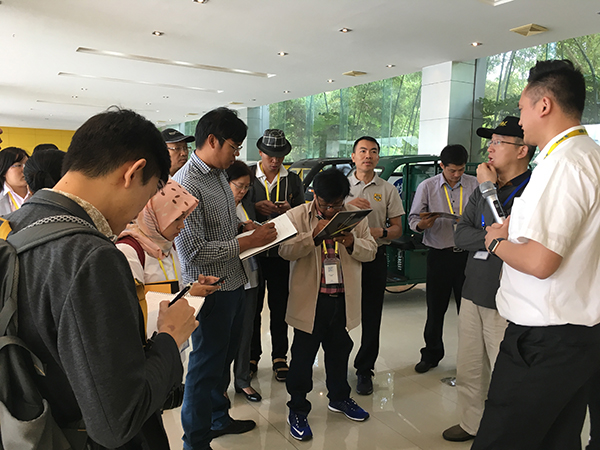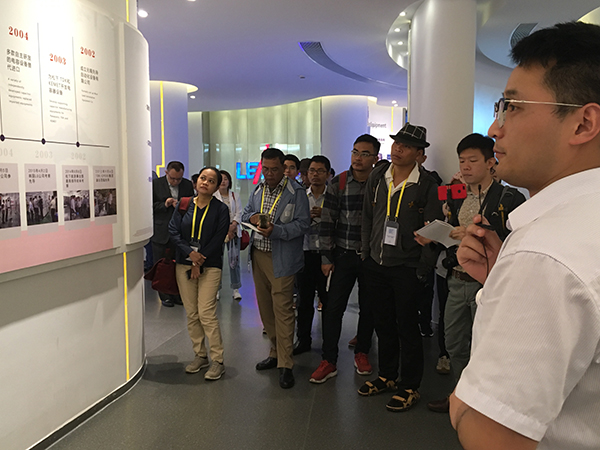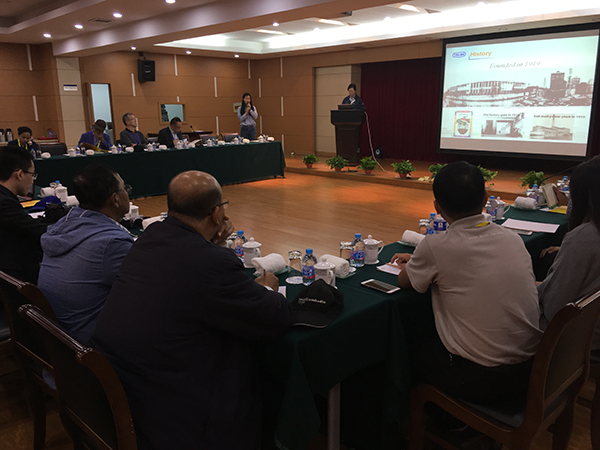
From 10 to 11 May 2018, the reporting trip for "ASEAN-China Jointly Building the 21st Century Maritime Silk Road" visited Wuxi, Jiangsu province. ASEAN and Chinese journalists visited Jiangsu Research & Development Centre for Internet of Things, Wuxi Lead Intelligent Equipment Company, Xinri E-vehicle, Wuxi No.1 Cotton Mill, Shanlian Village, Qingming Bridge Historical and Cultural Bloc where they learned about development of Wuxi's research and industry on high tech and innovation.
In Jiangsu Research & Development Centre for Internet of Things, the delegation listened to the briefing from the management. By means of initiative strength and lay-out of Chinese Academy Sciences, the Centre actively builds itself into China's innovation hub for internet of things, demonstration hub for industrial application, incubation hub for industries, and explore in technological research and integration, industrial incubation and service, application encouragement and demonstration, and internal mechanism and external mechanism like Academy-Local Government Cooperation. The Centre has become the largest research & development centre for internet of things and the largest cooperation platform affiliated to the Academy.

Wuxi Lead Intelligent Equipment Company, founded in 2002, is a leading company manufacturing lithium battery globally with a market value worth over RMB 30 billion. The company has over 3,000 employees, over 400 engineers. It has launched strategic cooperation with Panasonic, Sony, Samsung, LG, ATL, CATL, BYD, etc. The company possesses over 200 national patent licenses.
Jiangsu Xinri E-vehicle is mainly on research, development, manufacturing and sales of e-vehicles. Four manufacturing bases in Wuxi, Tianjin, Xiangyang and Guangdong are in operation. Its products are distributed to American, European and Southeast Asian markets, totaling over 70 countries and regions.

Wuxi No.1 Cotton Mill was established in 1919. It has over 1,700 employees, over 500 thousand spindles, over 500 machines. It can produce 25,000-ton precision-spinning cotton thread per year, 2,600-square-meter high-end clothes. Its annual income exceeds RMB 200 million. Its brand "Talak" has been registered in 55 countries across Europe, Asia and America, and its products are exported to global high-end markets.
The management of Wuxi Cotton Mill demonstrated the delegation with innovative outcomes of application of internet of things, intelligent equipment manufacturing, cotton manufacturing technology. The journalists actively interacted with the management on their business in ASEAN countries. The management respectively responed to all questions and wished ASEAN media could deeply learn about and report relevant innovative outcomes, and allow more people to understand the broader prospect and great potentials of ASEAN-China innovation cooperation, so as to contribute more to upgrading and improving ASEAN-China relations.

The delegation also visited Shanlian Village of Wuxi. According to the village officer, the village is located in the border area of Wuxi, Changshu and Jiangyin with an area of 68 thousand square kilometers. It combines 50 natural villages, 1,715 agricultural families, and 6,309 permanent residents. Since 2008, the village develops agricultural and leisure tourism by means of its ecological strength and strategic location. Annually, it hosts over 500 thousand tourists. In 2007, the village achieved net income of RMB 11 million, and net income per peasant reached RMB 32 thousand. Through the village's development experiences and achievements, the delegation learned more about China's new village programme.

The delegation also visited Qingming Bridge Historical and Cultural Bloc. The bridges, rivers, temples, pagodas, streets, blocs and workshops in ancient style left profound impression to the whole delegation.